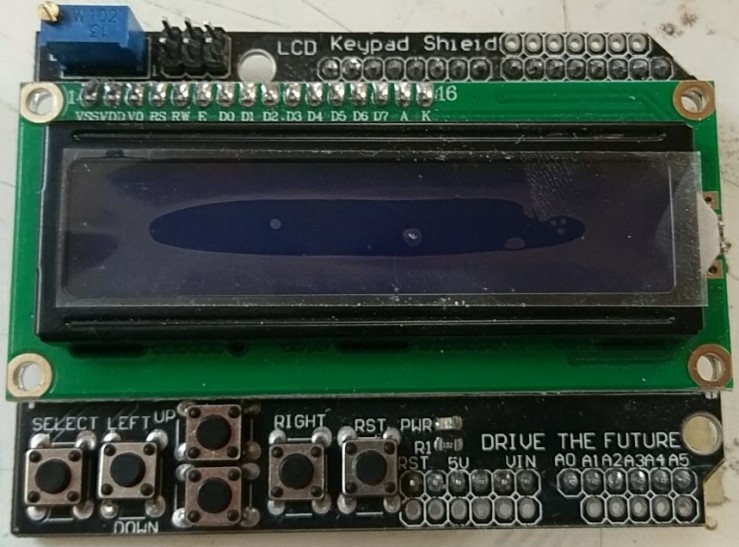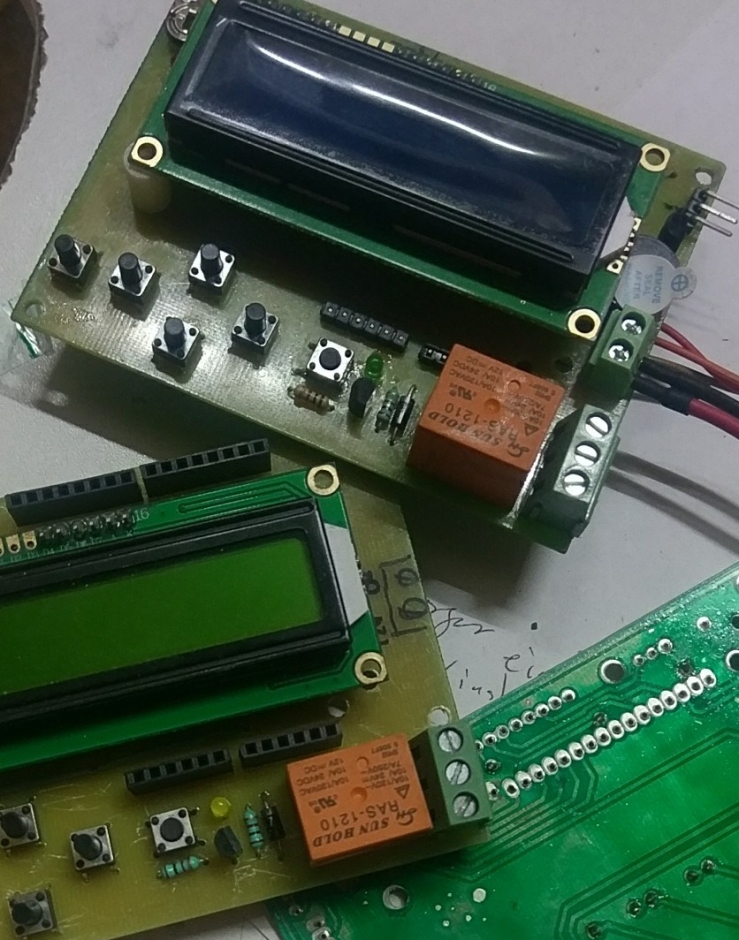The built-in analogRead() function blocks until the conversion is ready; for most scenarios this behavior is ok. However, for a high-responsive systems such behavior would be unacceptable.
Another reason I wrote this small non-blocking class is because I bought a lcd-keypad shield, and then I built some improved clones:


The keypad is implemented through an analog ladder, where each push-button is a rung. Tipically any keypad is decoded through a state machine driven inside the system-tick ISR for debounce purposes. That’s way I cannot use the analogRead() function. My class allows me to handle the conversion inside the system-tick ISR without blocking it. Weeee! You might discover other useful applications for a non-blocking conversions. I will glad to hear them!
Source code
My class is totally based upon the analogRead() source code. Moreover, I’ve left the original comments. What I did was to split it out in 3 stages: start, observe and read. Although my goal is to use a templetized class, this version works well for now for most purposes.
// Analog.hpp
/*Copyright (C)
* 2018 - fjrg76 at hotmail dot com
* This program is free software; you can redistribute it and/or
* modify it under the terms of the GNU General Public License
* as published by the Free Software Foundation; either version 2
* of the License, or (at your option) any later version.
*
* This program is distributed in the hope that it will be useful,
* but WITHOUT ANY WARRANTY; without even the implied warranty of
* MERCHANTABILITY or FITNESS FOR A PARTICULAR PURPOSE. See the
* GNU General Public License for more details.
*
* You should have received a copy of the GNU General Public License
* along with this program; if not, write to the Free Software
* Foundation, Inc., 59 Temple Place - Suite 330, Boston, MA 02111-1307, USA.
*
*/
#ifndef ANALOG_INC
#define ANALOG_INC
#include <Arduino.h>
#include "wiring_private.h"
#include "pins_arduino.h"
extern uint8_t analog_reference;
class Analog
{
public:
explicit Analog( uint8_t _pin );
void Start();
bool IsReady() const;
int Read() const;
private:
uint8_t pin;
};
#endif /* ----- #ifndef ANALOG_INC ----- */
// Analog.cpp
#include "Analog.hpp"
Analog::Analog( uint8_t _pin ) : pin{ _pin }
{
pinMode( this->pin, INPUT );
digitalWrite( this->pin, LOW );
#if defined(analogPinToChannel)
#if defined(__AVR_ATmega32U4__)
if (pin >= 18) pin -= 18; // allow for channel or pin numbers
#endif
pin = analogPinToChannel(pin);
#elif defined(__AVR_ATmega1280__) || defined(__AVR_ATmega2560__)
if (pin >= 54) pin -= 54; // allow for channel or pin numbers
#elif defined(__AVR_ATmega32U4__)
if (pin >= 18) pin -= 18; // allow for channel or pin numbers
#elif defined(__AVR_ATmega1284__) || defined(__AVR_ATmega1284P__) || defined(__AVR_ATmega644__) || defined(__AVR_ATmega644A__) || defined(__AVR_ATmega644P__) || defined(__AVR_ATmega644PA__)
if (pin >= 24) pin -= 24; // allow for channel or pin numbers
#else
if (pin >= 14) pin -= 14; // allow for channel or pin numbers
#endif
#if defined(ADCSRB) && defined(MUX5)
// the MUX5 bit of ADCSRB selects whether we're reading from channels
// 0 to 7 (MUX5 low) or 8 to 15 (MUX5 high).
ADCSRB = (ADCSRB & ~(1 << MUX5)) | (((pin >> 3) & 0x01) << MUX5);
#endif
// set the analog reference (high two bits of ADMUX) and select the
// channel (low 4 bits). this also sets ADLAR (left-adjust result)
// to 0 (the default).
#if defined(ADMUX)
#if defined(__AVR_ATtiny25__) || defined(__AVR_ATtiny45__) || defined(__AVR_ATtiny85__)
ADMUX = (analog_reference << 4) | (pin & 0x07);
#else
ADMUX = (analog_reference << 6) | (pin & 0x07);
#endif
#endif
}
void Analog::Start()
{
// without a delay, we seem to read from the wrong channel
//delay(1);
#if defined(ADCSRA) && defined(ADCL)
// start the conversion
sbi(ADCSRA, ADSC);
#endif
}
bool Analog::IsReady() const
{
#if defined(ADCSRA) && defined(ADCL)
// ADSC is cleared when the conversion finishes
return !bit_is_set( ADCSRA, ADSC );
#else
// we don't want to get stuck
return true;
#endif
}
int Analog::Read() const
{
uint8_t low, high;
#if defined(ADCSRA) && defined(ADCL)
// we have to read ADCL first; doing so locks both ADCL
// and ADCH until ADCH is read. reading ADCL second would
// cause the results of each conversion to be discarded,
// as ADCL and ADCH would be locked when it completed.
low = ADCL;
high = ADCH;
#else
// we dont have an ADC, return 0
low = 0;
high = 0;
#endif
// combine the two bytes
return (high << 8) | low;
}
Example
Just a little example:
#include <Arduino.h>
#include "Analog.h"
int main(void)
{
init();
Analog a0( A0 );
while( 1 )
{
a0.Start();
while( not a0.IsReady() );
auto read = a0.Read();
// do something with the reading
}
}
Greetings!


[…] the Arduino’s code in order to break the ADC code into 3 parts. You might want to read that entry in my alternative blog. But this is not a general purpose solution […]
Me gustaMe gusta